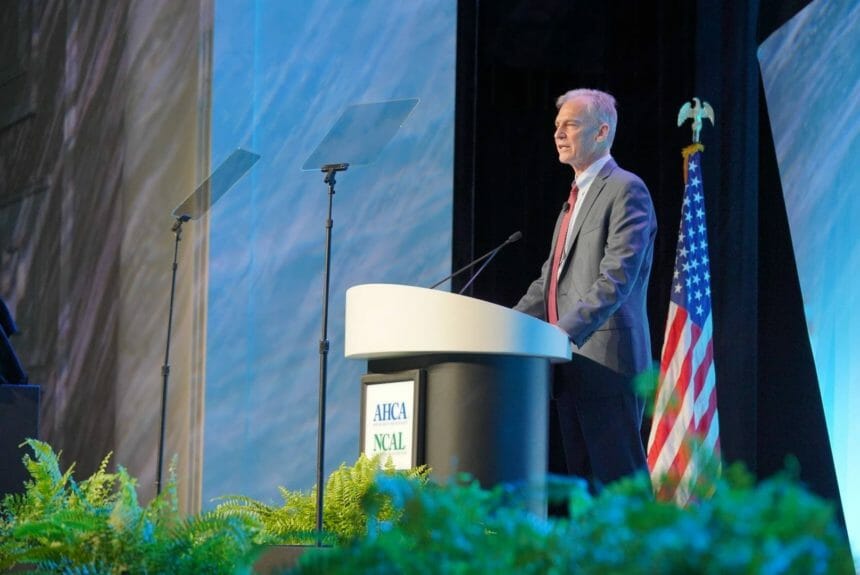
Oxon Hill, MD — When Mark Parkinson, president and CEO of the American Health Care Association/National Center for Assisted Living learned of the first U.S. COVID outbreak site at the Life Care Center of Kirkland, WA, last February, he quickly realized three things.
The first was that even Five-Star rated facilities, like Kirkland, could have a COVID-19 outbreak. The second was that if there were an outbreak, that provider would be in “real trouble” due to the disease’s rapid spread and deadly consequences in long-term care.
The final lesson?
“No matter what you’ve done to prepare and to fight it, we were going to get blamed,” Parkinson said at Monday’s opening of the 72nd AHCA/NCAL Convention & Expo held just outside Washington, D.C. “That is when I knew we were in real trouble.”
“At that point as a sector we had a choice, we could have either given up or we could have fought. You made the decision to persevere, to not quit and we fought on.”
Parkinson kicked off the organization’s first general session in two years. The morning featured a parade of speakers sharing personal tales from the pandemic’s darkest days and praising the heroes who helped skilled nursing homes survive.
Despite the serious nature of the virus, Parkinson said the pandemic created a sense of unity among industry operators, staffers and vendors. He touted the association’s lobbying prowess and its ability to secure $20 billion in relief funding, including Provider Relief Funds and increased Medicaid matching, for the sector.
But much of the presentation focused on the emotional turmoil that has ravaged the industry since early 2020.
Parkinson credited providers for persevering, saying their efforts potentially saved “tens of thousands of lives.”
Kirkland infection control nurse Alice Cortez, who noticed an increase in upper respiratory infections at her facility before any COVID-19 cases could be confirmed, was among those Parkinson singled out for rousing applause from fellow attendees.
Cortez implemented detailed infection control protocols after suspecting some of her residents might have COVID. Despite receiving no help and assurances from state and local officials that it wasn’t COVID-19, she continued to follow her gut.
“She was flying on her own and she did an exceptional job by continuing to implement infection control protocols,” Parkinson said.
He also recognized Chelsey Earnest, one of the many nurses who provided extra staffing support to Kirkland after the outbreak was found. Earnest worked 21 straight night shifts — in addition to day jobs — for four months to help. Todd Fletcher, then-vice president of Life Care’s Western Division Operations, also stepped in and did “whatever needed to be done” to help staff for months.
“That is just representative of what happened, not just at Life Care of Kirkland, but at all of the nursing homes and assisted living facilities across the country,” Parkinson said. “You didn’t give up.”
Parkinson said the vaccine provided some hope that the industry is closer to the end of the pandemic — until the Delta variant hit — and implored providers to stay unified and keep fighting.
“Unfortunately, this battle isn’t over yet,” Parkinson said. “The delta variant is not going to crush our recovery. It is simply just going to pause it. We’re going to go from where we are right now, we’re going to put this clinical nightmare behind us and on the business side, we will recover.”





